The term “cloud” suggests something immense, extending across a vast expanse. In the realm of technology, “the cloud” refers to a virtual entity that offers services to end-users, including data storage, application hosting, and the virtualization of physical resources.
In today’s landscape, cloud computing is harnessed by organizations of all sizes to store data and provide customers with the benefits outlined above.
Primarily, there are three types of cloud services:
- SaaS (Software as a Service) – This service enables users to access publicly available clouds provided by large organizations for data storage, such as Gmail.
- PaaS (Platform as a Service) – PaaS allows users to host applications or software on other public clouds. For example, Google App Engine hosts user applications.
- IaaS (Infrastructure as a Service) – IaaS virtualizes physical machines, making them available to customers and providing an experience similar to using a real machine.
What is Cloud Storage?
Cloud Storage refers to the practice of storing data on remote servers rather than on users’ local systems. This concept dates back to 1983 when CompuServe initially provided its customers with 128k of disk space for file storage.
Since then, the field of cloud storage has undergone continuous development, and it will continue to evolve due to ever-present threats like data loss, information breaches, hacking, and other malicious attacks.
As a result, many organizations have stepped up to offer their own solutions in cloud storage and data privacy, contributing to the strengthening and stabilization of its future
In this article, we will showcase selected open-source cloud storage software for Linux that has gained widespread acceptance among both large organizations and the general public.
1. OwnCloud
As a Dropbox alternative for Linux users, ownCloud provides numerous functionalities similar to those of Dropbox. It operates as a self-hosted file sync and share server.
Its open-source functionality provides users with access to an unlimited amount of storage space. The project started in January 2010 with the aim to provide an open-source replacement for proprietary cloud storage service providers. It is written in PHP, JavaScript and is available for Windows, Linux, and OS X desktops, and even successfully provides mobile clients for Android and iOS.
OwnCloud employs a WebDav server for remote access and can integrate with a large number of databases including SQLite, MariaDB, MySQL, Oracle Database, and PostgreSQL.
Provides a large number of features countable which include: file storage and encryption, music streaming, content sharing across URLs, mozilla sync hosting and RSS/atom feed reader, one-click app installation, video, and pdf viewer, and many more.
The latest version of ownCloud i.e. 10 adds other new features including improved design, which allows the admin to notify users and set retention limits on files in the trash.
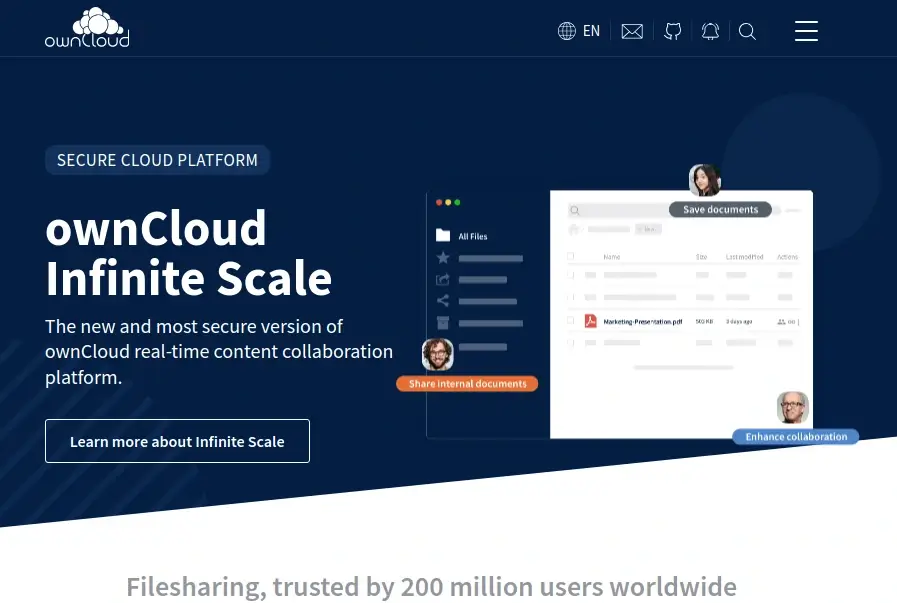
2. Nextcloud
Nextcloud is an open-source suite of client-server applications for creating and using file hosting services. The software is available for everyone from individual to large enterprises to install and operate the application on their private server device.
With Nextcloud you can share multiple files and folders on your system and sync them with your nextcloud server. The functionality is similar to Dropbox, but it offers on-premises file storage hosting with strong security, compliance, and flexibility in synchronization and sharing solutions to the server that you control.
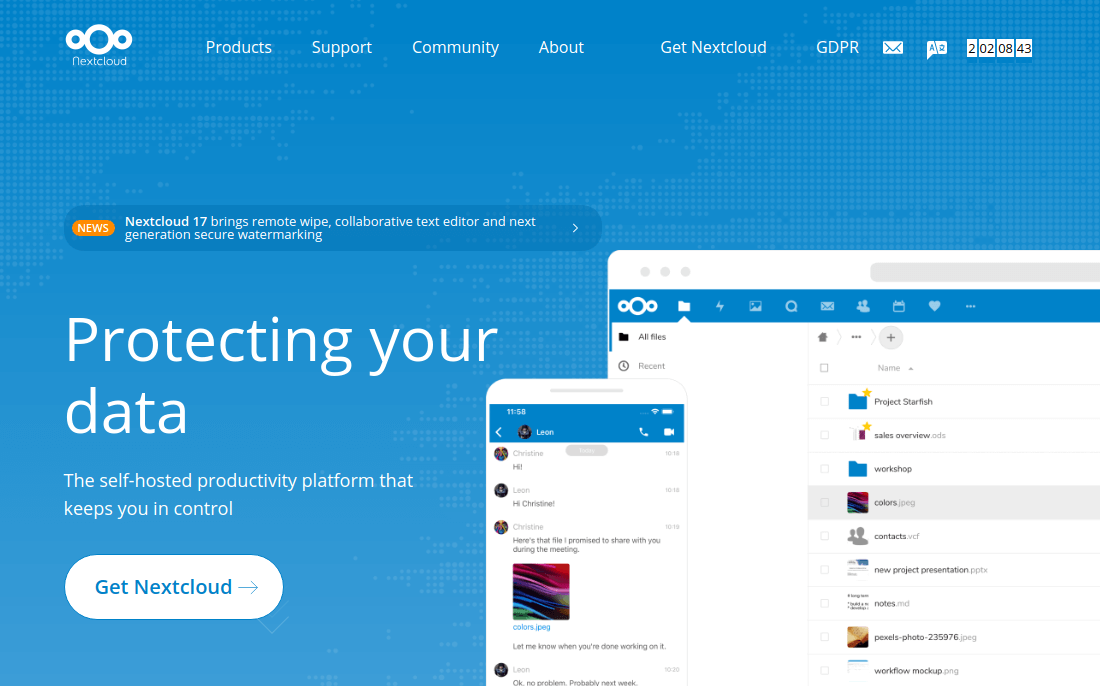
3. Seafile
Seafile is another file-hosting software system that exploits open-source property to avail its users of all the advantages they expect from a good cloud storage software system. It is written in C, and Python with the latest stable release being 10.0.1.
Seafile provides desktop clients for Windows, Linux, and OS X and mobile clients for Android, iOS, and Windows Phone. Along with a community edition released under a General Public License, it also has a professional edition released under a commercial license that provides extra features not supported in the community edition i.e. user logging and text search.
Since it got open-sourced in July 2012, it started gaining international attention. Its main features are syncing and sharing with the main focus on data safety.
Other features of Seafile that have made it common in many universities like University Mainz, University HU Berlin, and University Strasbourg and also among other thousands of people worldwide are online file editing, differential sync to minimize the bandwidth required, client-side encryption to secure client data.
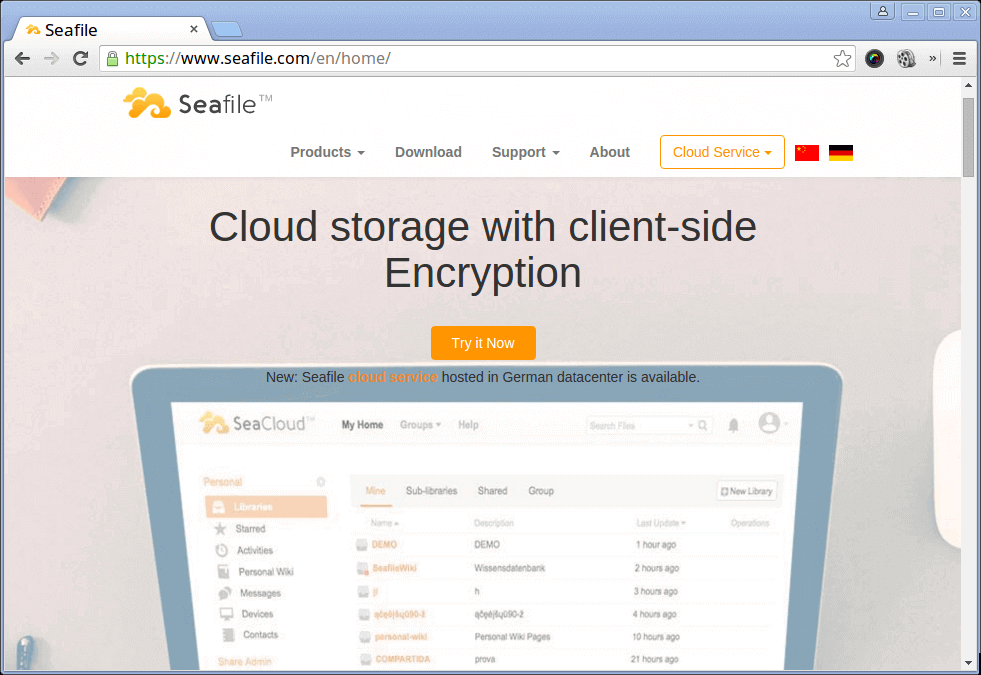
4. Pydio Cells
Pydio Cells, previously recognized simply as Pydio and formerly referred to as AjaXplorer, is open-source file-sharing and synchronization software that can operate on the user’s personal server or in the cloud.
Pydio Cells is accessible in two distinct distributions: a free and open-source community version (Pydio Cells Home) and a commercially licensed enterprise version (offered in two variants, Pydio Cells Connect and Pydio Cells Enterprise). The enterprise distributions provide additional features that are not found in the community version and offer enhanced support options beyond what’s available in the community forums.
Other features that come with this software are a text editor with syntax highlighting, audio and video playback, integration of Amazon, S3, FTP, or MySQL Databases, image editor, and file or folder sharing even through public URLs.
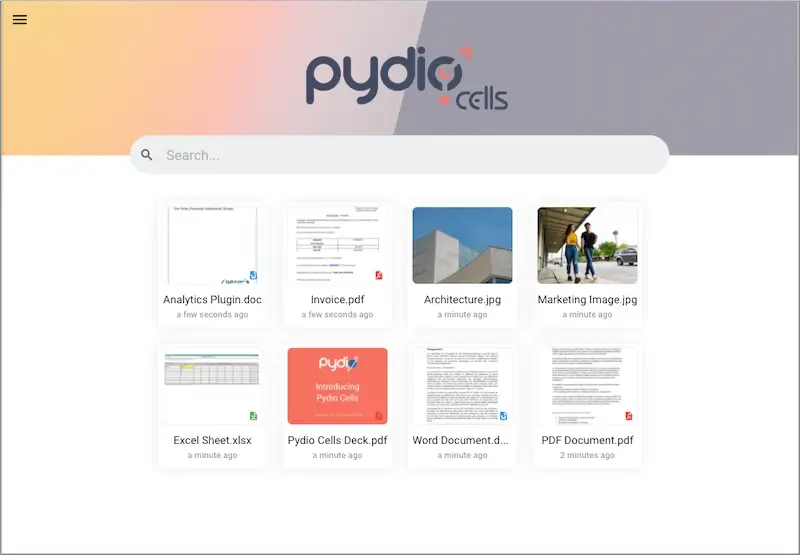
5. Ceph
Ceph was initially started by Sage Weil for his doctoral dissertation, and in the fall of 2007, he continued on this project full-time and expanded the development team.
In April 2014, Red Hat brought its development in-house. Till now 18 releases of Ceph have been released and the latest version is 18.2.0. Ceph is a distributed cluster written in C++ and Python and is highly scalable and freely available.
Data can be populated in Ceph as a block device, a file, or in the form Object through RADOS gateway which can present support for Amazon S3 and Openstack Swift API. Apart from being secure in terms of data, Scalable, and reliable, other features provided by Ceph are:
- network file system which aims for high performance and large data storage.
- compatibility with VM clients.
- allowance of partial/complete reads/ writes.
- object level mappings.

6. Syncany
Syncany is one of the lightest and open-source cloud storage and file-sharing applications that is currently being actively developed by Philipp C. Heckel and as of today, is available as a command-line tool and GUI for all supported platforms.
One of the most important features of Syncany is that it is a tool that requires you to bring in your own storage, which can be FTP or SFTP storage, WebDAV or Samba Shares, Amazon S3 buckets, etc.
Other features that make it an awesome tool to have are 128-bit AES+Twofish/GCM encryption for all the data leaving the local machine, file-sharing support with which you can share your files with your friends, offsite storage as chosen by the user instead of provider-based storage, interval-based or on-demand backups, binary compatible file versioning, local deduplication of files.
It can be more advantageous for companies who want to use their own storage space rather than trusting some providers to provide storage.
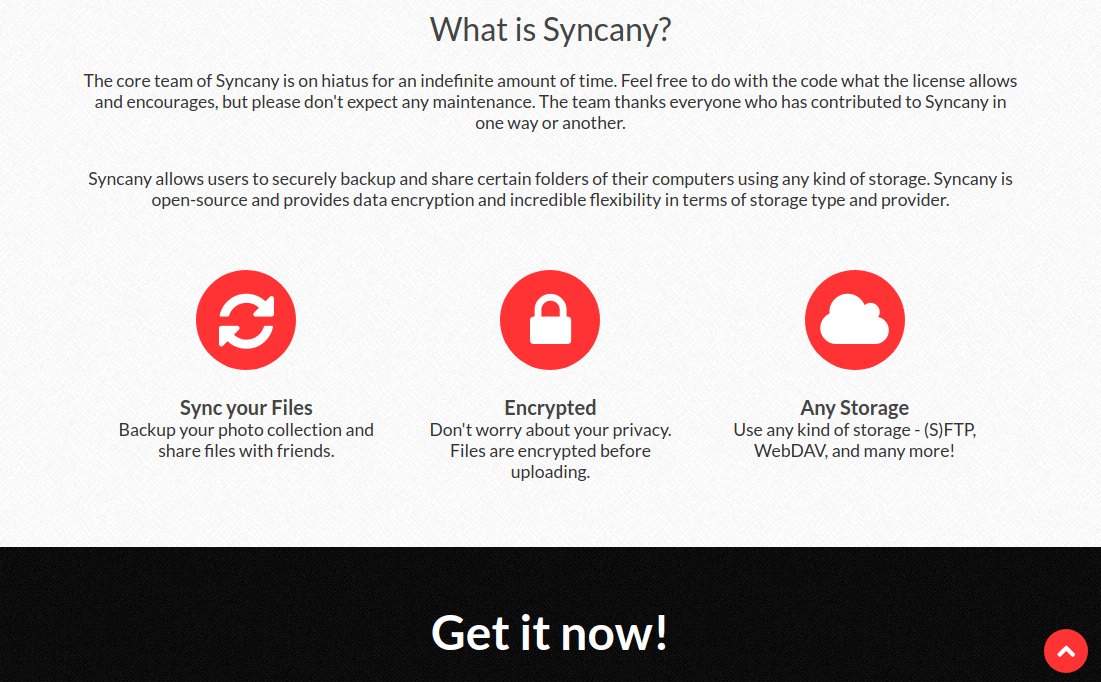
7. Cozy
Not just a file-sharing or synchronization tool or software, Cozy is bundled as a complete package of functions that can help you build your complete App Engine.
Like Syncany, Cozy provides flexibility to the user in terms of storage space. You can either use your own personal storage or trust the Cozy team’s servers.
It relies on some open-source software for its complete functioning which is: CouchDB for Database storage and Whoosh for indexing. It is available for all platforms including smartphones.
The main features that make it a must to have Cloud storage software are the ability to store all the Contacts, Files, Calendar, etc in the Cloud and sync them between laptop and smartphone, providing the ability to create his own apps and share them with other users by just sharing Git URL of the repository, hosting static websites or HTML5 video game consoles.
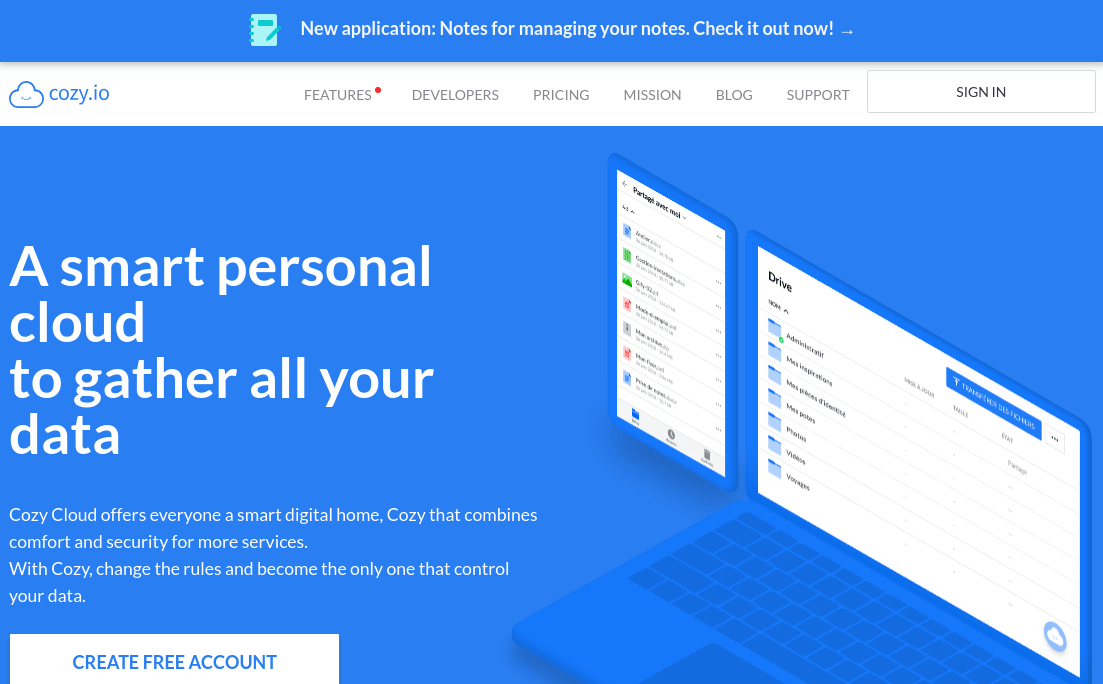
8. GlusterFS
GlusterFS is a network-attached file storage system. Initially, started by Gluster Inc., this project is now under Red Hat Inc. After their purchase of Gluster Inc. in 2011. Red Hat integrated Gluster FS with their Red Hat Storage Server changing its name to Red Hat Gluster Storage.
It is available for platforms including Linux, OS X, NetBSD, and OpenSolaris with some of its parts licensed under GPLv3 while others dual-licensed under GPLv2. It has been used as a foundation for academic research.
GlusterFS uses a client-server model with servers being deployed as storage bricks. A client can connect to a server with a custom protocol over TCP/IP, Infiniband, or SDP and store files to the GlusterFs server.
Various functionalities being employed by it over the files are file-based mirroring and replication, file-based stripping, load balancing, scheduling, and disk caching to name a few.
Another very useful feature of it is that it is flexible i.e. data here is stored on native file systems like xfs, ext4, etc.
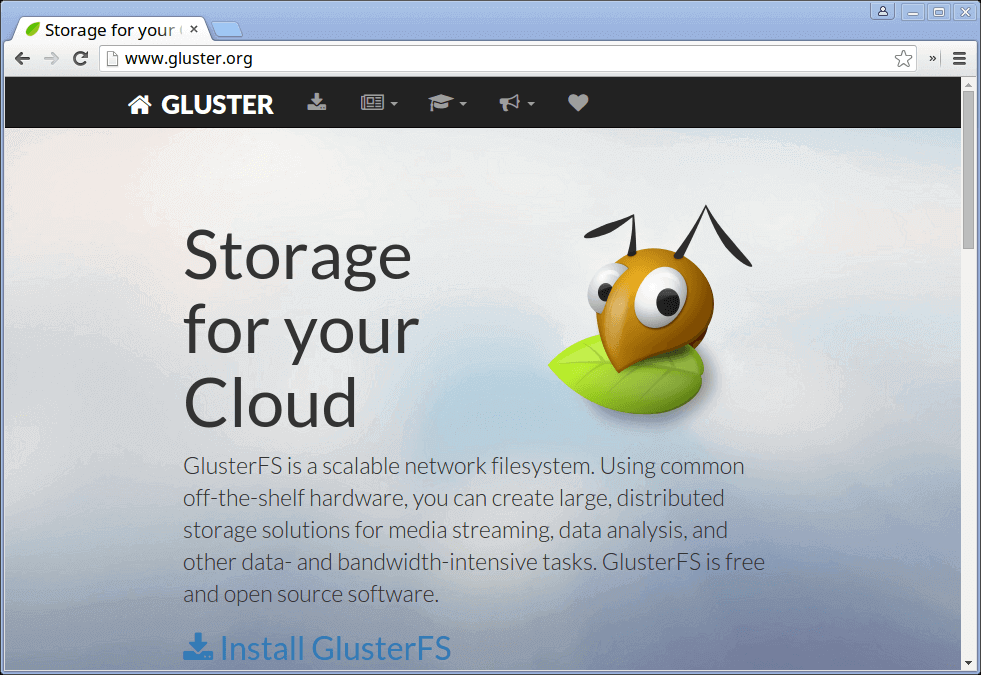
9. Git-annex
Git-annex is another file synchronization service developed by Joey Hess, which also aims to solve file sharing and synchronization problems but is independent of any commercial service or central server. It is written in Haskell and is available for Linux, Android, OS X, and Windows.
Git-annex manages the git repository of the user without storing the session in git. But instead, it stores only the link to the file in the git repository and manages the files associated with the link in a separate place. It ensures the duplicate of a file that is needed in case the recovery of lost information is required.
Further, it ensures the availability of file data instantly as and when required which prevents files to present on each system. This reduces a lot of memory overhead. Notably, git-annex is available on various Linux distributions including Fedora, Ubuntu, Debian, etc.
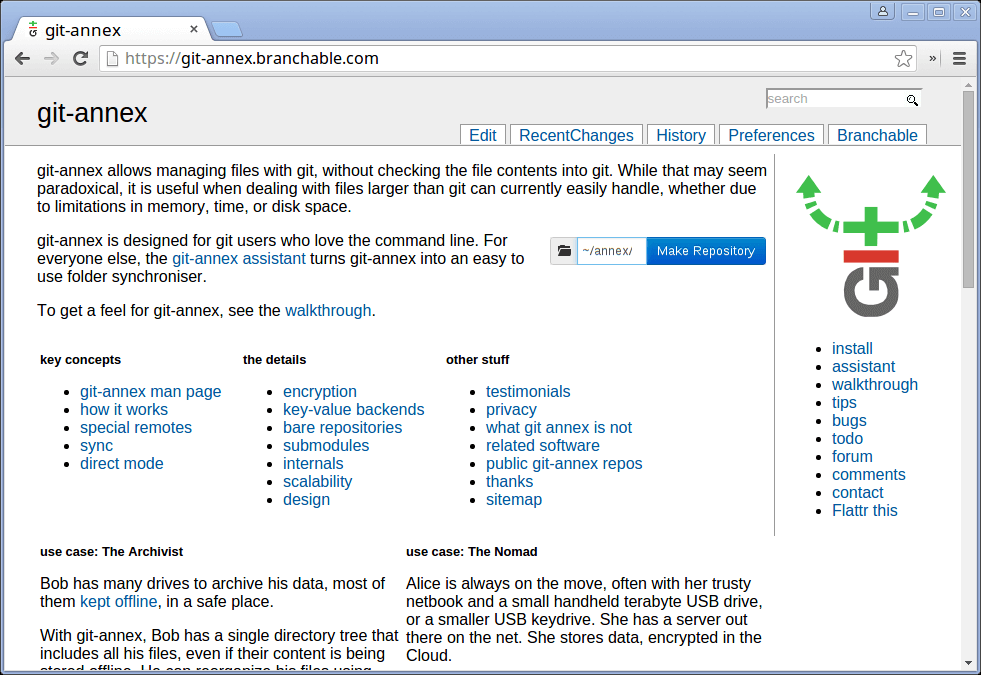
10. XigmaNAS
XigmaNAS is an open-source powerful and customizable storage NAS (meaning Network-Attached Storage) operating system based on FreeBSD, built for sharing computer data storage over a computer network.
It can be installed on virtually any hardware platform and supports the sharing of data across Linux and other Unix-like operating systems, Windows as well as Mac OS.
Some of its features include support for ZFS v5000, software RAID (0,1,5), disk encryption, S.M.A.R.T / email reports, and much more. It supports multiple network protocols including CIFS/SMB (Samba), Active Directory Domain Controller (Samba), FTP, NFS, and RSYNC among others.
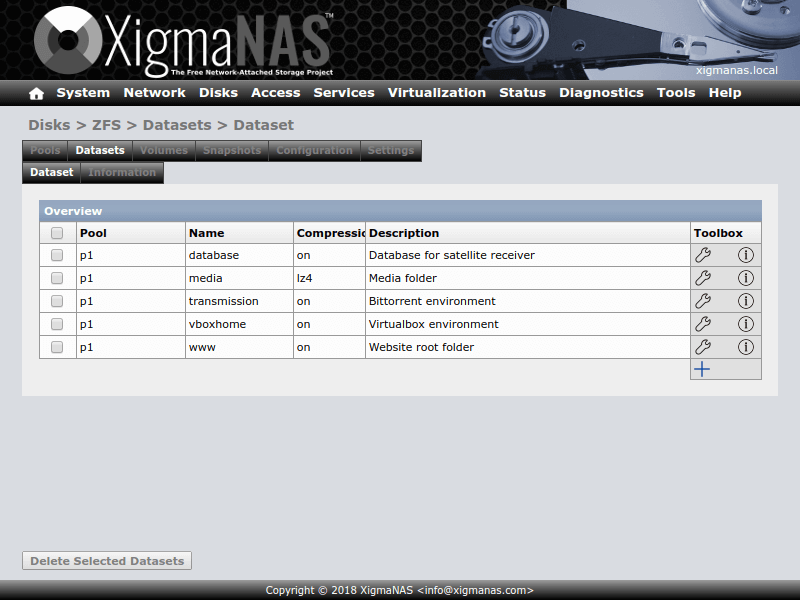
11. Yunohost
Yunohost is a free and open-source lightweight, reliable, and secure self-hosting operating system based on Debian GNU/Linux. It simplifies server administration by offering a friendly web interface for you to administrate your server.
It allows for the management of user accounts (via LDAP) and domain names, supports the creation and restoration of backups, and comes with a full email stack (Postfix, Dovecot, Rspamd, DKIM) and an instant messaging server. Besides, it supports security tools such as yunohost-firewall and fail2ban, and management of SSL certificates.
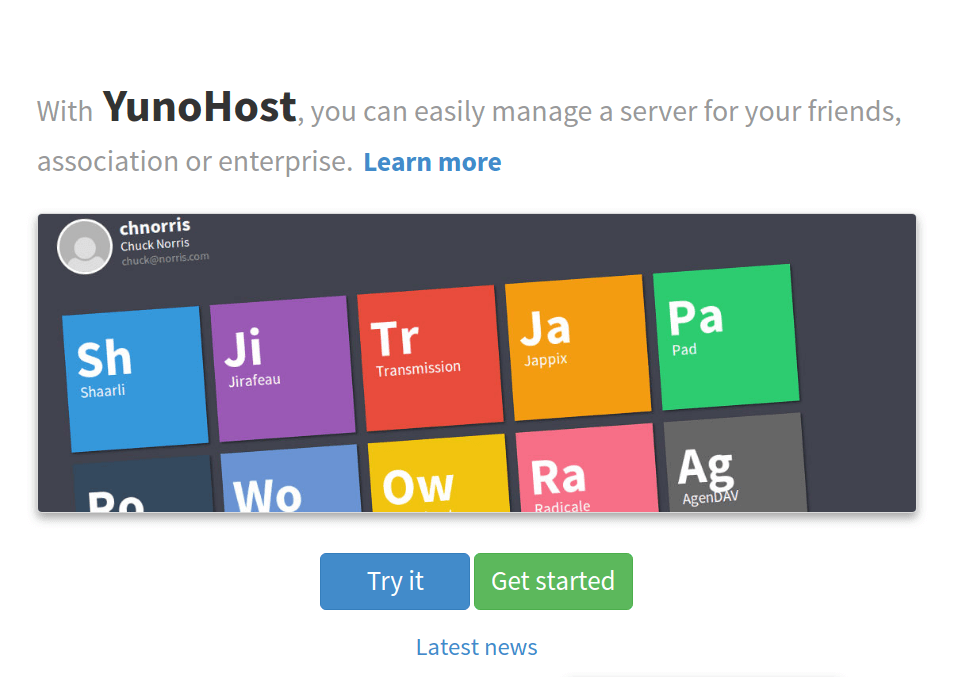
12. Sandstorm
Sandstorm is an open-source self-host web-based productivity suite designed to run easily and securely open-source web applications either on your own private server or on community-run servers.
It supports file storage and sharing with others using Davros, a chat app, a mailbox, a task and project management app, a document editing feature, and many others.
Each application you install in the Sandstorm is containerized in its own secure sandbox from which it cannot communicate to the world without express permission. And importantly, Sandstorm supports a secure operation model which makes it easy to adhere to security, regulatory, and data privacy requirements.
It is built for individuals, businesses, and developers.
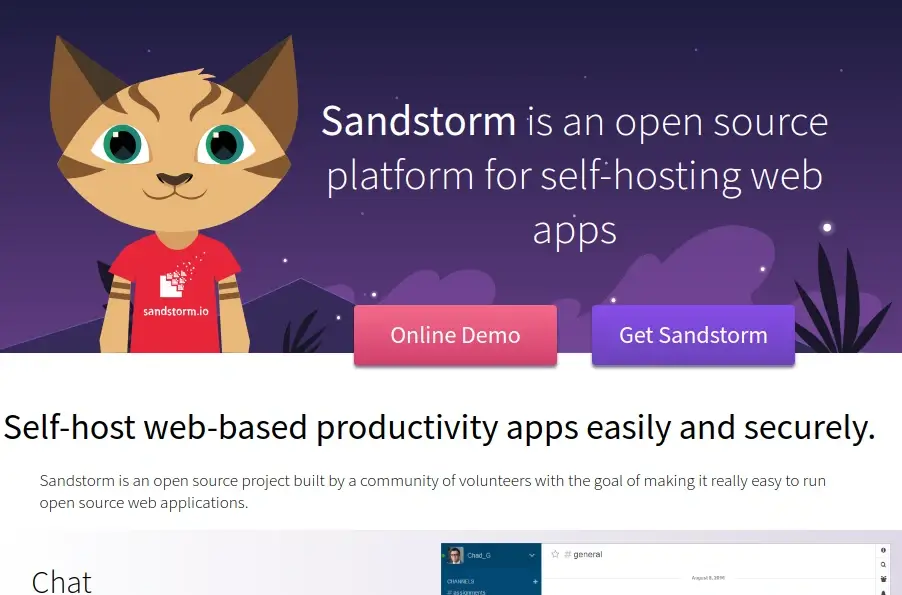
13. Syncthing
Syncthing is an open-source, simple yet powerful, and portable private and secure continuous file synchronization tool that synchronizes files between two or more hosts in real-time. It works on Linux, Mac OS X, Windows, FreeBSD, Solaris, and OpenBSD.
All communication via Syncthing is encrypted (secured using TLS) and every device is identified by a strong cryptographic certificate to ensure secure authentication. You can set up and monitor Syncthing operations via a powerful and responsive user interface(UI) accessible via a web browser.
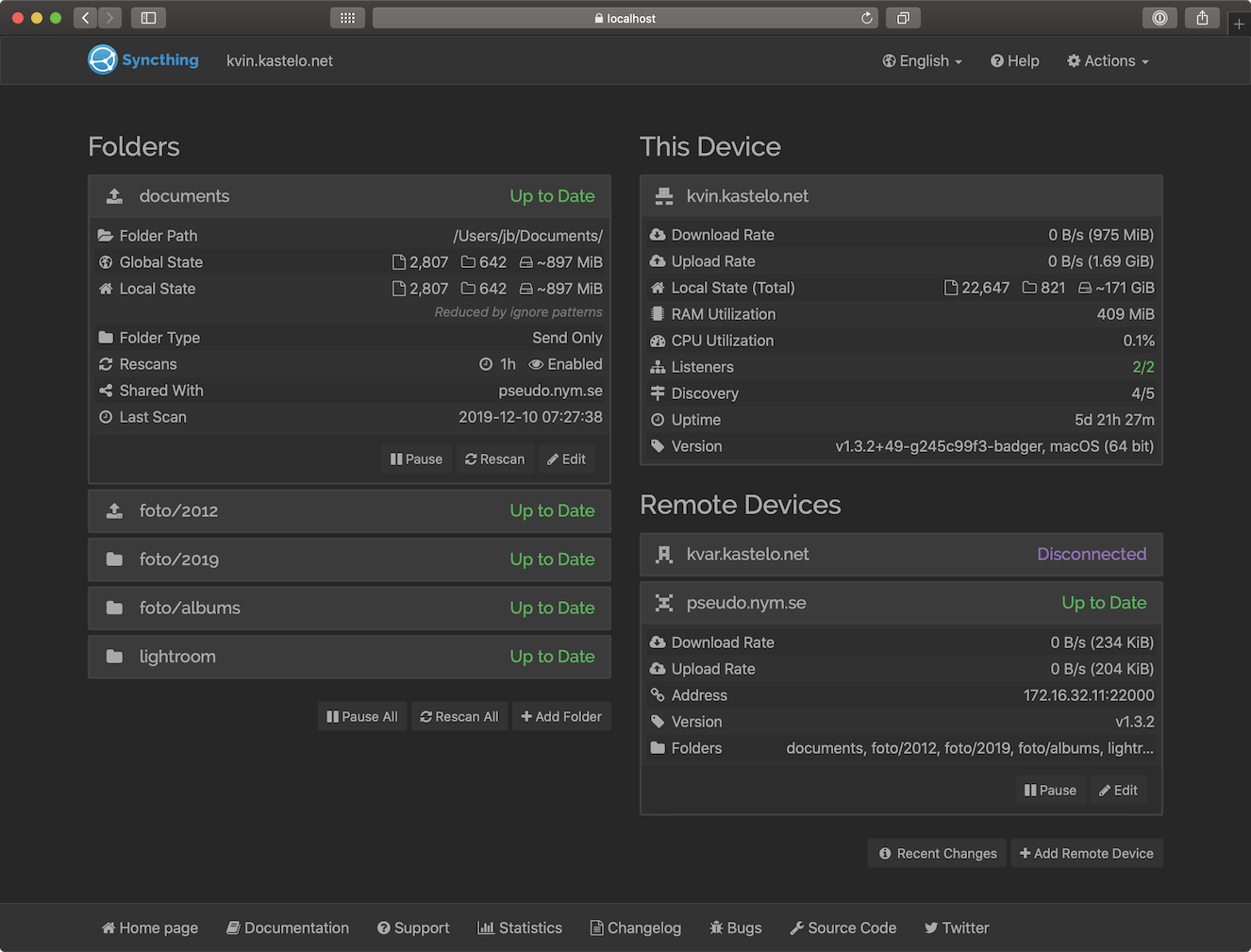
14. FileCloud
FileCloud is a private and secure cloud storage service that supports file sharing, sync, backup, and remote access for home and business use. It runs on Linux, Windows, Mac, and all major mobile phones and tablets including iPhone, iPad, Android, and Windows Phone. Besides, it works on Raspberry Pi.
It allows you to access, and share files from your computer at home. Business users can employ it to organize, search, share, sync, backup, and govern enterprise documents to your employees, customers, and clients. Also, it supports ultra-fast, high-performance media organization and access from anywhere.
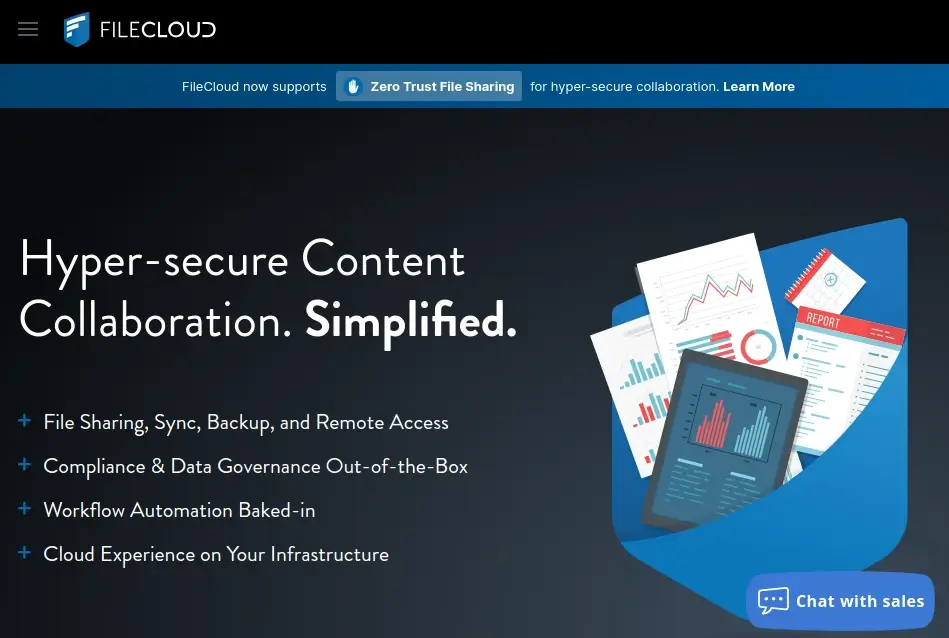
15. Cloud Storage Server
Cloud Storage Server is an open-source, secure, extensible, self-hosted cloud storage API for building your own private cloud storage solution. It is a self-contained tool therefore you do not need to install a separate web server or enterprise database engine and is designed to be relatively easy to integrate into your environment.
The underlying server software implements a complete file system similar to Amazon Cloud Drive and other providers. It supports file-based cloud storage operations such as folder hierarchy management, file upload/download, copies, moves, renames, trash and restores, delete, and more. It also features per-user quota management, per-user daily network transfer limits and so much more.
Conclusion
These are some known Open Source Cloud storage and synchronization software that have either gained a lot of popularity over the years or have just been able to enter and make their mark in this industry with a long way to go. You can share any software that you or your organization might be using and we will be listing that with this list.


